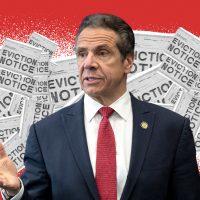Commercial tenants are getting a small reprieve from Gov. Andrew Cuomo.
New York’s moratorium on commercial foreclosures and evictions will be in place until at least Oct. 20, Cuomo announced on Friday. The moratorium was set to expire Sept. 30, but the governor signed a new executive order extending the ban for another month.
But the state allowed commercial eviction warrants to be issued beginning Sept. 4 for cases that commenced before March 17, and some of those cases may now proceed.
Read more


Under Cuomo’s original order from March, initiating a proceeding or carrying out a commercial eviction for nonpayment of rent, or foreclosing on a commercial mortgage due to nonpayment is off limits.
The initial moratorium on evictions also included residential evictions and foreclosures, but those provisions have not been renewed. The initial blanket protections have been replaced by state legislation, according to Cuomo’s executive order. The Tenant Safe Harbor Act prohibits evictions of eligible tenants if any part of the county is still shut down by the government as a result of Covid-19.
Some of the 14,000 backlogged residential evictions can be carried out starting in October if they are not covered by the federal eviction ban issued by the Centers for Disease Control in early September.
New York state’s residential eviction policies have left many confused — even those in state and local governments. One state agency recently mistakenly announced that the current eviction moratorium would be in place through the end of the year. The agency, which administers state benefits programs, corrected its gaffe three days later.
Residential mortgages that meet certain qualifications are also eligible for six months of forbearance and an additional six-month extension if their lender is a state-regulated financial institution. To be eligible, borrowers have to demonstrate Covid-related financial hardship.
